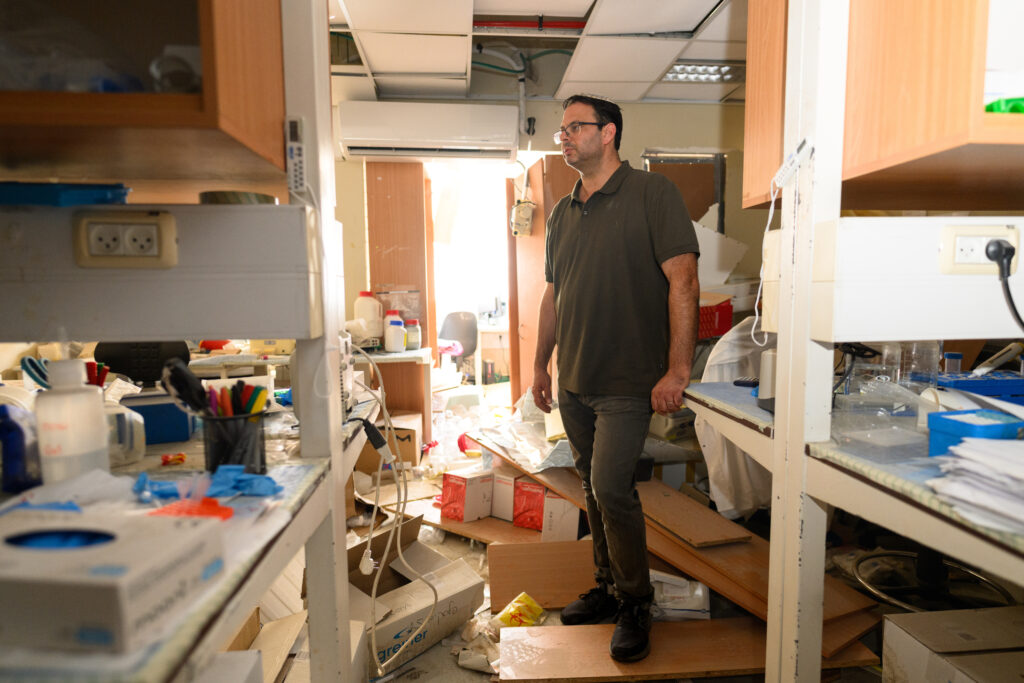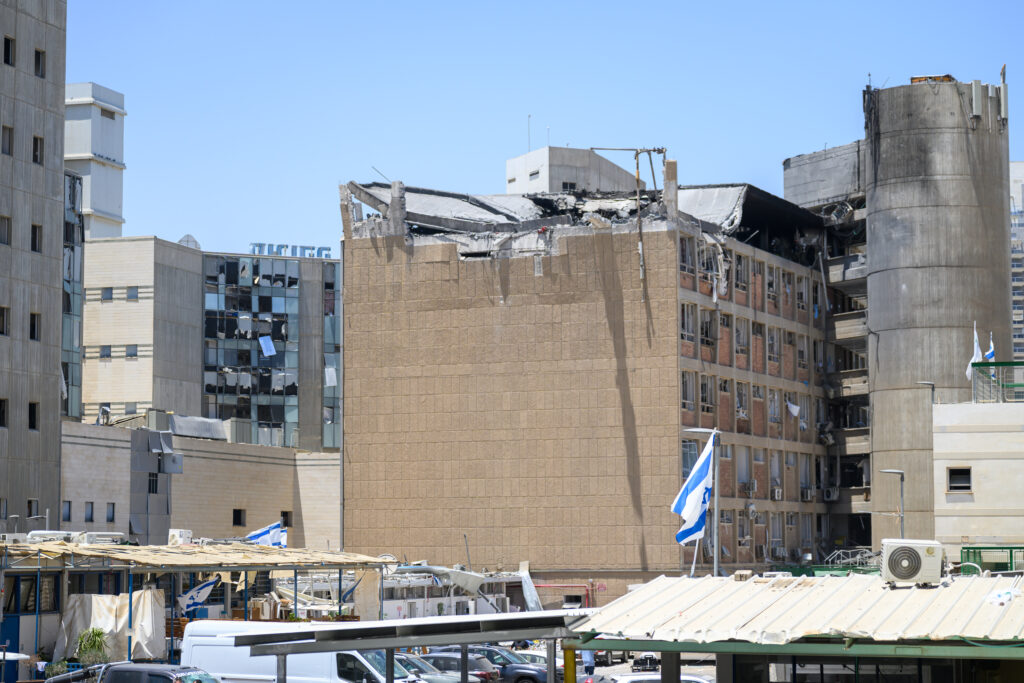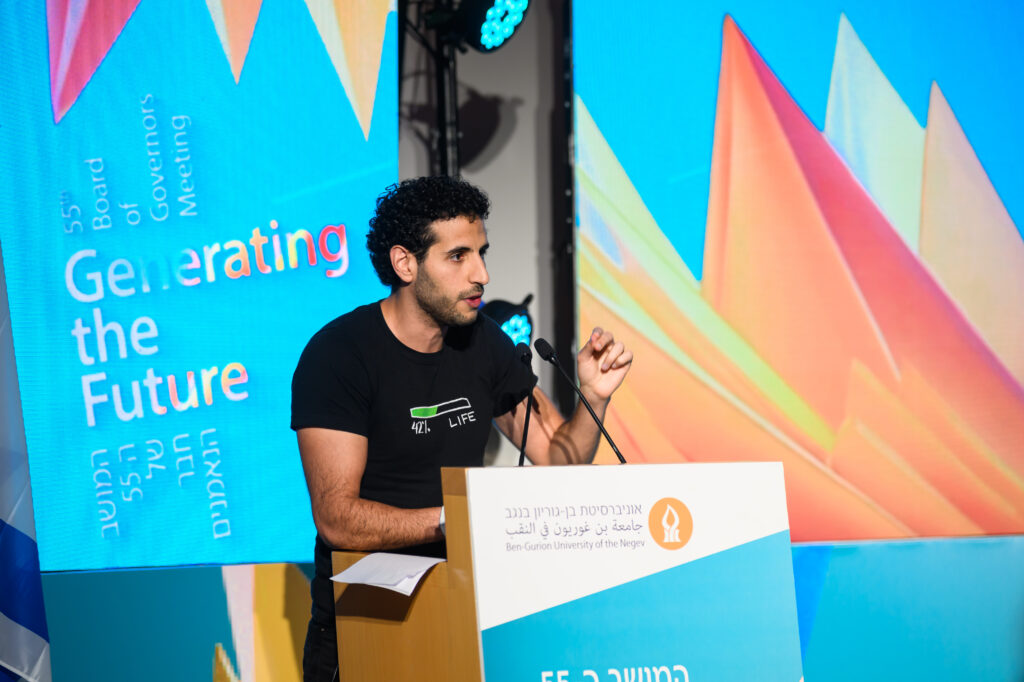
BGU Medical Student-Reservists Share Their Resilience Stories
BGU Medical Student-Reservists Share Their Resilience Stories
August 29, 2024
Intermountain Jewish News – For most young Israelis, the post-high school years go like this: two years of compulsory military service, followed by a gap year of traveling, then off to university, trade school, or the workforce.
Shaked Ben Shushan, 27, and Eliyahu Green, 28, are pulling double duty as both IDF reservists and medical students at Ben-Gurion University of the Negev (BGU). They have been traveling around the world this summer telling audiences how they are trying to manage their stressful lives as both students and soldiers in a time of war.
They recently spoke in Denver, Vail, and Aspen accompanied by Americans for Ben-Gurion University (A4BGU) CEO Doug Seserman and BGU Vice President for Public Affairs and Resource Development Jeff Kaye.
Shaked Ben Shushan
When Shaked returned from synagogue on October 7th, she turned on her cellphone and saw a lot of messages from Soroka University Medical Center, in Beer-Sheva, BGU’s affiliated hospital.
Shaked ended up reporting as an army medic and treating the wounded at Kibbutz Erez in the northern part of the Gaza envelope, attacked by Hamas terrorists on October 7. “That was the first time that I really understood that I am participating in a war,” she said.
With her battalion, Shaked crossed the border on foot, walking five kilometers (3.1 miles) and carrying her medical equipment weighing 24 kilograms (53 pounds). Shaked will never forget a scenario that took place on a Friday night as she and her team members were gathering in a house for Shabbat prayers and dinner. The Hamas terrorists spotted us and sent a rocket accurately to our location. There was a big, loud explosion. Then silence. One soldier in Shaked’s battalion did die, and Shaked knows quite a few other people who died in the war.
Shaked was back at BGU, trying to find a balance between her two worlds — the war and studying to be a doctor.
Shaked says she doesn’t know if she’s experiencing PTSD, but she does think about the Gaza experience at night, sleeping only about three hours a night. “Since I’ve returned from Gaza,” said Shaked, “I can only focus for about 50 minutes. After that mind starts to blow. It’s tough to find a balance. BGU has been really understanding with the situation.”
Eliyahu Green
After his mandatory service, Eliyahu spent two years in his father’s native Canada and worked as a bodyguard before enrolling in BGU. After a first “great” year at BGU, Eliyahu went to Sri Lanka for a month between semesters. “I was having fun, and then the 7th of October hit.”
Eliyahu decided he needed to get back to Israel, and he got on an evacuation flight from Dubai to Israel on October 9.
After a few weeks of training, Eliyahu and his unit were the first platoon to be sent into Gaza, where they started going from house to house, looking for terrorists. Ultimately, they were engulfed in a harrowing night of explosions and flying debris. After a huge explosion, three of the men in Eliyahu’s unit, including his commanding officer, fell to the ground.
“I thought my ear blew off. We all dispersed. I pictured my life without an ear. Slowly, gradually, I put my hand to my ear, and thought, “OK, I have an ear,” but it was bleeding. ‘I guess it’s just a scratch.’”
The commander officer had been shot in the back, and he put Eliyahu in charge. “I was in charge of making sure everyone’s OK,” he recalled. In all, 13 soldiers were wounded, seven of whom were put on tanks to there border, where helicopters transported them to medical care.
The doctor saw that Eliyahu had a piece of shrapnel that went through his ear and into his skull, and sent him via tank straight to the border, where a chopper took him to Ein Kerem Hadassah Hospital in Jerusalem. While Eliyahu was in the hospital in Jerusalem, he was approached by a foundation for wounded soldiers, offering help. “They helped me a lot,” he said.
Eliyahu learned that this foundation had no representatives at Soroka University Medical Center, in Beer-Sheva, where Eliyahu would be returning for his study at BGU, so he offered to reach out to wounded soldiers at Soroka and help them and their families, and he’s been doing so on a volunteer basis ever since. In turn, Eliyahu helped the social worker find other students with invisible injuries from the war or from October 7 itself.
Eliyahu is open about his psychological struggles. “I’ve been seeing a psychologist for the past couple of months. I was struggling. I’m not scared to say I was showing signs of PTSD, reliving those scenarios on a daily basis, but seeing the psychologist is helping.”




